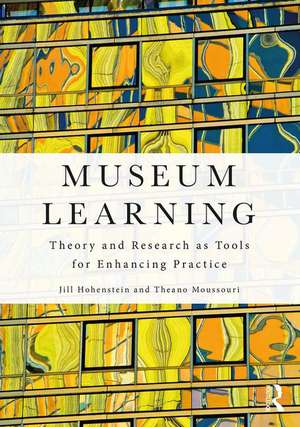Museum Learning: Theory and Research as Tools for Enhancing Practice
Autor Jill Hohenstein, Theano Moussourien Limba Engleză Paperback – 17 oct 2017
Museum Learning attempts to make sense of multiple learning theories whilst focusing on a set of core learning topics in museums. Importantly, learning is considered not just as a cognitive characteristic, as some perspectives propose, but also as affective, taking into consideration interests, attitudes, and emotions; and as a social practice situated in cultural contexts. This book draws attention to the development of theory and its practical applications in museum situations such as aquariums, zoos, botanical gardens and historical re-enactment sites, among others.
This volume will be of interest to museum studies students, practitioners and researchers working in informal learning contexts, and will help them to reflect on what it means to learn in museums and create more effective environments for learning.
| Toate formatele și edițiile | Preț | Express |
|---|---|---|
| Paperback (1) | 426.94 lei 6-8 săpt. | |
| Taylor & Francis – 17 oct 2017 | 426.94 lei 6-8 săpt. | |
| Hardback (1) | 1117.07 lei 6-8 săpt. | |
| Taylor & Francis – 17 oct 2017 | 1117.07 lei 6-8 săpt. |
Preț: 426.94 lei
Nou
Puncte Express: 640
Preț estimativ în valută:
81.69€ • 85.30$ • 67.46£
81.69€ • 85.30$ • 67.46£
Carte tipărită la comandă
Livrare economică 16-30 aprilie
Preluare comenzi: 021 569.72.76
Specificații
ISBN-13: 9781138901131
ISBN-10: 113890113X
Pagini: 330
Ilustrații: 4 Line drawings, black and white; 7 Halftones, black and white; 2 Tables, black and white
Dimensiuni: 174 x 246 x 22 mm
Greutate: 0.55 kg
Ediția:1
Editura: Taylor & Francis
Colecția Routledge
Locul publicării:Oxford, United Kingdom
ISBN-10: 113890113X
Pagini: 330
Ilustrații: 4 Line drawings, black and white; 7 Halftones, black and white; 2 Tables, black and white
Dimensiuni: 174 x 246 x 22 mm
Greutate: 0.55 kg
Ediția:1
Editura: Taylor & Francis
Colecția Routledge
Locul publicării:Oxford, United Kingdom
Cuprins
Acknowledgements, List of Contributors, Chapter 1 Introduction, References; Chapter 2 Theory and Museum Practice, What’s in a theory?, What are they good for?, Where do they come from?, Theories about learning, Constructivism as an illustrated case, References; Chapter 3 The Importance of Methods and Methodology for Museum Practice, Philosophical background to research, Approaches to research, Methods of research, Trustworthiness and transferability, Summary, References, Topic Chapters; Chapter 4 Museums and the Making of Meaning, Do Jews have a rule against gay or lesbian people?, Introduction, The basics of meaning making, Meaning making in the museum, A return to the Jewish Museum, Contextualising meaning making, References; Chapter 5 Narrative, Discourse, and Matters of Communication, Experiences on Room 41, Introduction, The basics of discourse and narrative, Narrative and the museum perspective, Museum research drawing upon the visitor perspective, A return to Room 41, Contextualising narrative, discourse, and communication, References; Chapter 6 Degrees of Authenticity in Museums, Authentic nature play at the Chicago Botanic Garden, Introduction, The basics of authenticity, Museums and the perception of authenticity, Summary and reflections, A return to the Learning Campus at CBG, Contextualising authenticity, References; Chapter 7 Remembering, Reminding, and Reminiscing in Museums, Build your own bush bark hut, Introduction, Basics of personal constructs of memory, Basics of constructs about collective memory, Museums and memory studies, A return to the bush bark huts, Contextualising memory, References; Chapter 8 The Role of Self and Identity in Learning, The art of voicing Black women’s identity as seen through everyday objects, Introduction, The basics of identity, Self and identity in the museum context, A return to the Colored Girls Museum, Contextualising self and identity, References; Chapter 9 Motivation: From Visiting to Devotion, Linking up museums and people through serious pursuits, Introduction, The basics of motivation, Motivation in museums, A return to the VIP programme Contextualising motivation, References; Chapter 10 Questioning culture and power in museums, Aboriginal people and museums working together, Introduction, The basics of culture and power, Culture and power in the museum context, A return to museum-Aboriginal communities collaborations, Contextualising culture and power, References; Chapter 11 Conclusions, References, Glossary, Index
Notă biografică
Jill Hohenstein is Senior Lecturer in Psychology in Education at the School of Education, Communication and Society, King’s College London. Trained as a developmental psychologist, her research examines the ways that children and adults learn in informal settings, including museums, with a particular focus on language and cognitive development.
Theano Moussouri is Senior Lecturer in Museum Studies at the Institute of Archaeology, University College London. She previously worked in museums as an audience researcher. Her current research examines motivation and meaning-making in museum visitors and non-visitors; museum professionals’ development and sharing of knowledge; and researcher-practitioner collaborative research.
Theano Moussouri is Senior Lecturer in Museum Studies at the Institute of Archaeology, University College London. She previously worked in museums as an audience researcher. Her current research examines motivation and meaning-making in museum visitors and non-visitors; museum professionals’ development and sharing of knowledge; and researcher-practitioner collaborative research.
Descriere
Museum Learning employs a ‘learning’ lens to highlight the insights and practical applications that theoretical approaches can offer museum studies students, practitioners and researchers working in informal learning contexts such as museums, aquariums, zoos and botanical gardens, and historical re-enactments, among others. The volume looks beyond traditional or cognitive notions of learning, offering new ideas on affective modes of learning which take into account interests, attitudes and emotions. This book will shed light on various approaches to informal learning allowing students and informal practitioners to create more effective environments for learning.
